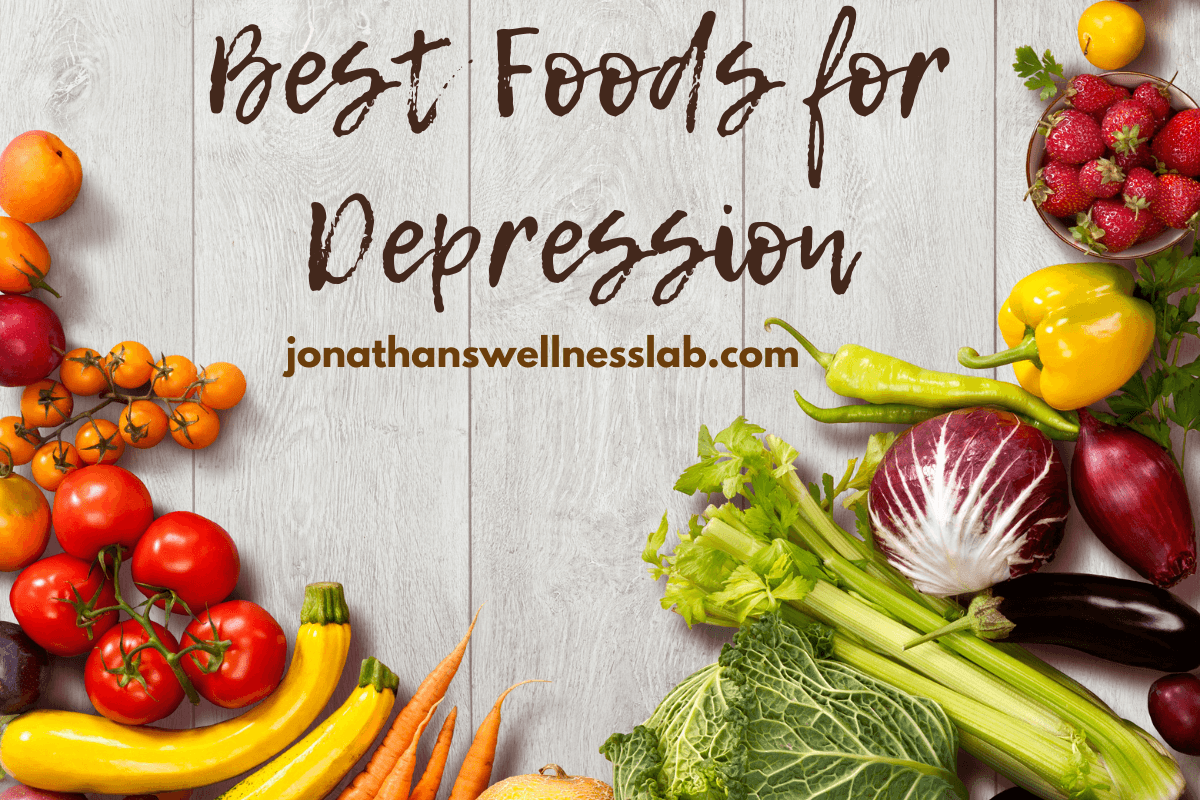
Do you ever crave a bag of donuts or a box of cookies when you get down in the dumps? Don’t beat yourself up! Sugar is around every nook, cranny, and corner. The great news is that the best foods for depression are also the foods that crowd out sugar.
Research has shown that eating a Mediterranean-style diet that is rich in whole foods is a great way to boost mental health! I compiled a list of 8 of the best foods for depression – all of which are part of the Mediterranean Diet.
1. Pastured Eggs
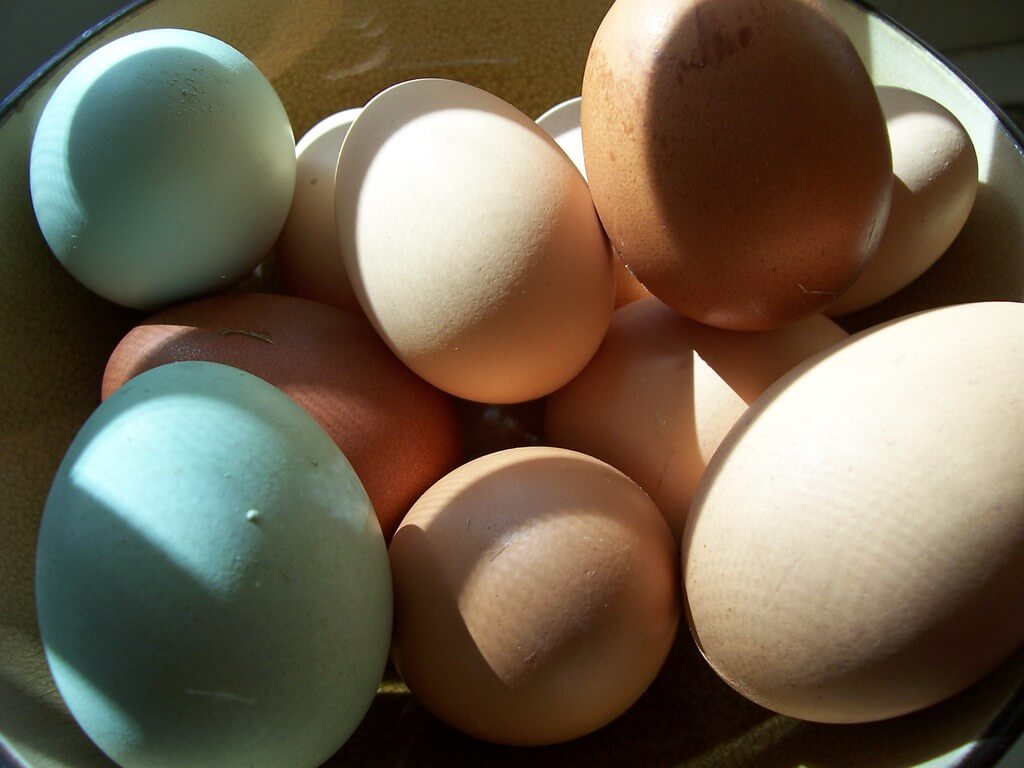
Previously thought to be an unhealthy food, eggs are actually loaded with a lot of brain food nutrition that helps to reduce depression and boost overall mental health.
Eggs also make you smarter too! They’re high in choline – a very valuable brain nutrient.
Calorie per calorie, eggs are inexpensive and easy to find, and there are great deals that you can find at the farmers market.
Here are a few brain-boosting benefits of eggs:
- High in omega-3 fatty acids
- Boost mental health by supporting a good quality of sleep.
- Rich in b12 – critical for producing serotonin.
- It contains lutein – a nutrient that improves cognitive function.
… and much more! Eggs are a delicious way to get in a ton of brain-healthy nutrients.
Make sure to purchase pastured eggs. Research shows that pastured eggs may be a lot more nutritious than conventional ones.
Beware of tricky marketing when it comes to eggs. “Vegetarian fed” may sound like a good label, but it’s really not.
When a chicken eats a healthy diet full of plants and insects, they produce healthier eggs. A 100% vegetarian diet is not a chicken’s natural diet.
It’s not necessary to eat eggs every single day, but find ways that you can start adding them to your life.
Start whipping up omelets for breakfast, add eggs to your lunch salad, or do what I do and eat a baked omelet for dinner that is loaded with tons of vegetables. So delish! Never gets old.
2. Kefir
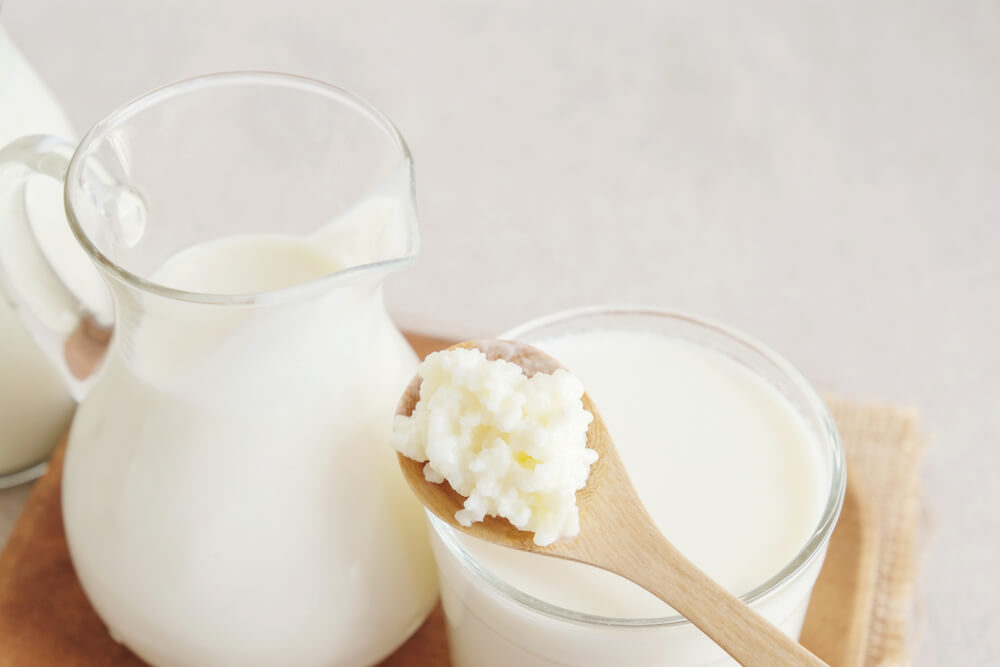
Kefir is an ancient staple that can be found in cultures all across the world. It’s a tasty fermented dairy product that most often comes from goats and cows.
Ah yes, and it may be one of the best foods for depression by boosting brain health and mood.
Did you know that there’s another brain besides the one between your ears? It’s called the gut.
The gut is a treasure trove of beneficial microorganisms that support the production of serotonin – the happiness neurotransmitter.
It’s all lower in lactose than milk and can be made 100% lactose-free.
If you’re on a budget, I recommend a brand called Lifeway. It’s an inexpensive brand that you can easily find in the refrigerated section of popular grocery chains.
Low-temp pasteurized goat kefir is the healthiest option if you can afford it. It costs a bit more but is lower in inflammatory properties than cow’s milk.
If you enjoy spending time in the kitchen, the most affordable option is to create your own kefir.
How to add kefir to your diet? You can pour it into your yogurt bowl, drink it straight, or do what I do and put a cup in a smoothie. It tastes so delicious when added to berries and veggies. I’m not a natural veggie lover, so the tangy taste helps to cover up the vegetable flavor.
Be careful with brands that add sugar. Honestly, it’s not necessary and the taste of plain kefir is comparable to that of plain Greek yogurt.
If you don’t like plain dairy, it’s easy to add fruit, stevia, or other sweeteners to kefir.
3. Dark Chocolate
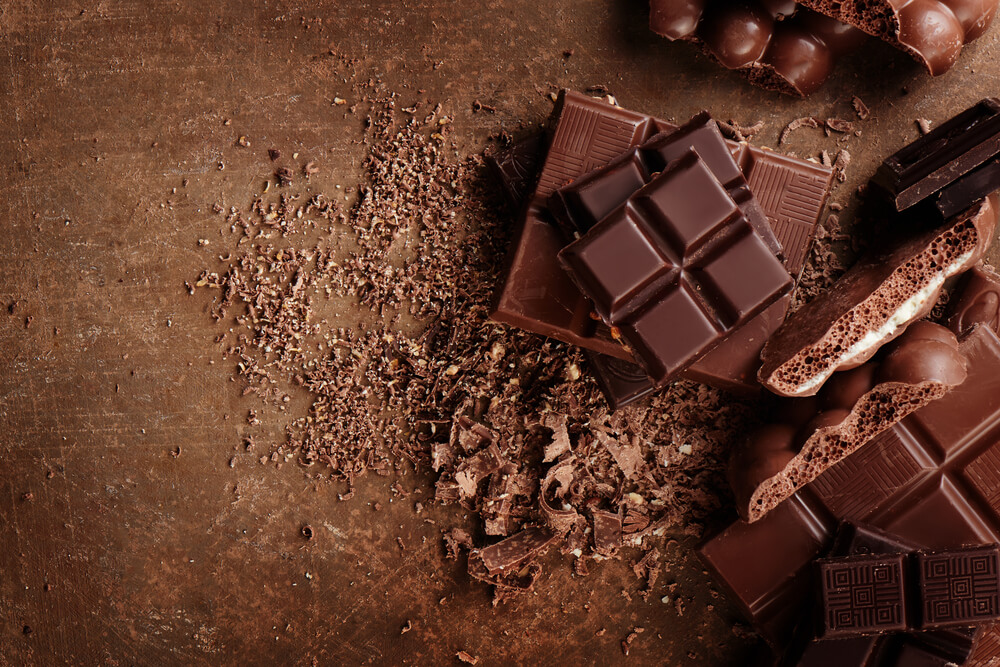
As a natural-born chocolate lover, I’m thrilled to add dark chocolate to my list of the best foods for depression.
A survey-based study showed that people who eat dark chocolate on a regular basis have a lower incidence of depression.
It’s more than a coincidence. Here are a few reasons why dark chocolate is one of the best foods for depression:
- High in antioxidants, helping to protect brain cells from damage.
- May help to reduce age-related memory decline.
- Improves blood flow to parts of the brain that need it.
- It may lower the risk of heart disease and strokes, both of which damage the brain.
- Boosts athletic performance which supports circulation to the brain.
- Rich in brain-boosting flavanols.
Dark chocolate is a tasty way to boost your brain health and help ward off depression and anxiety.
What to Watch Out For With Chocolate
Tip: Shop wisely! There are a lot of “dark chocolate” products on the shelves that are loaded with added sugar and maybe even artificial ingredients.
Look for labels such as “certified organic”, and “no sugar added”, and watch for funny-sounding ingredients on the ingredients list. If you can’t pronounce an ingredient, it’s probably bad for you.
How to get in your dark chocolate? The possibilities are endless with this versatile ingredient! Start making recipes at home, healthy milkshakes, or enjoy a cup of brain-soothing hot cocoa.
Most organic chocolate bars cost a few dollars or so. If you can afford it, great! If not, you can purchase a big container of organic cocoa and use it for your recipes. It’s cheap and there are so many options in both solid and liquid form.
Warning about dark chocolate: you have to watch out for the caffeine content!
While I’m not against caffeine by any means, I recommend not having it in the late afternoon or evening as it can negatively affect sleep.
Holy smokes, I’ve had so many nights of insomnia throughout my life because of eating dark chocolate in the evening!
If you choose to have dark chocolate in the evening, consider getting a healthy caffeine-free version.
4. Fatty Fish
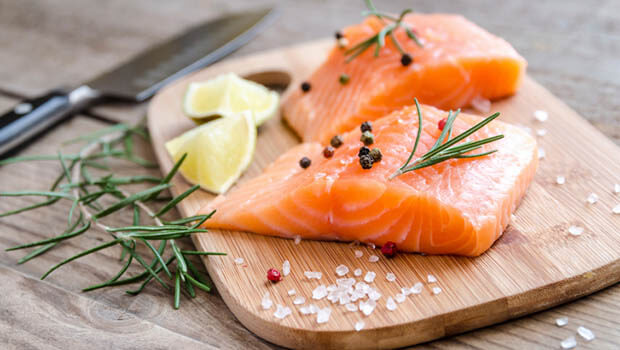
Fatty fish, such as salmon and sardines, are loaded with omega-3 fatty acids. Omega-3 fats are a depression-fighting nutrient that supports optimal mental well-being.
Depression appears a lot less in people who eat fish on a regular basis. The Mediterranean diet, long touted to be the healthiest diet in the world, is loaded with brain-boosting fish and monounsaturated fats.
A study in the British Journal of Nutrition found that women who adhered to the Mediterranean diet were about 60% less likely to develop depression. That’s a lot!
Fish, combined with monounsaturated fat, possess powerful anti-inflammatory and brain-boosting properties.
If you’re not a natural fish lover or are vegan, you can also get your omega-3 fatty acids through algae (like spirulina) or certain types of seeds, like hemp seeds or walnuts.
If you love fish like me, look for ways to add fish to your diet. You can make salmon patties, bake your fish, or put a strip of salmon on your toast.
My personal favorite way to get my fish in is by eating a can of sardines that is filled with olive oil. I love eating sardines in olive oil because I also get the benefit of monounsaturated fats. It’s a healthy fat bomb!
Warning about fish. Make sure to limit or avoid fish that are high in mercury. Aim for lower mercury fish like salmon or sardines. Refer to this list to know which fish to avoid.
5. Pumpkin Seeds
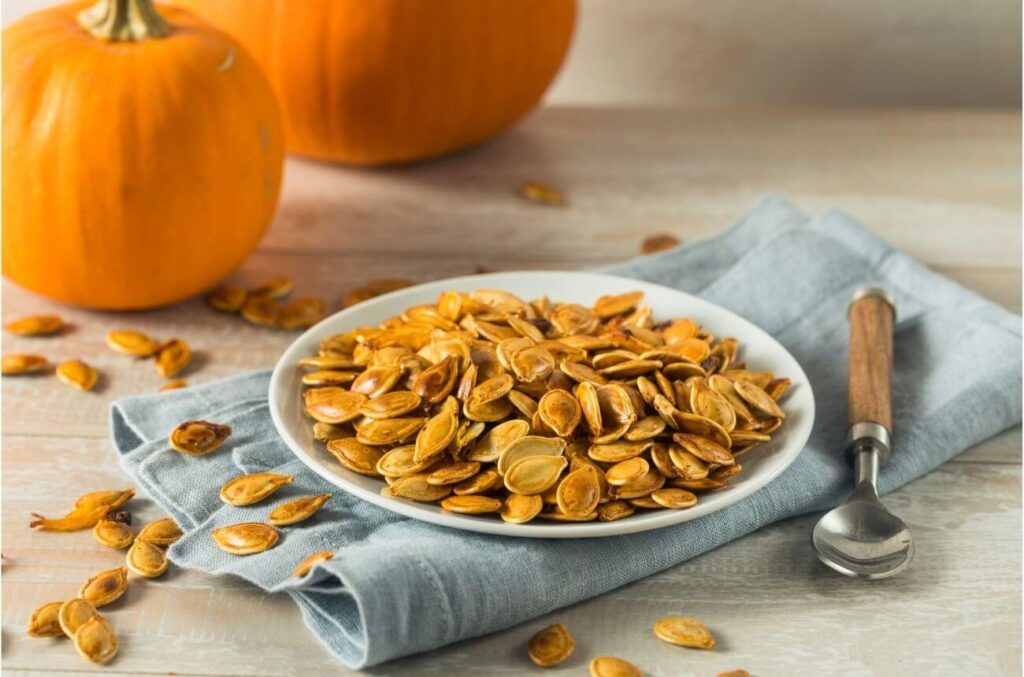
I’ve never been a big fan of pumpkin anything. Pumpkin pie is off the menu for me on Thanksgiving. Thankfully, pumpkin seeds are a tasty alternative to mushy pumpkins! They may also be one of the best foods for depression and anxiety.
Scientists believe that the fruit (yes, it’s a fruit) originated in America about 9,000 years ago and became a historically important food amongst indigenous Americans.
Since then, they’ve spread to the four corners of the Earth and have become an inexpensive brain food for mankind.
Here are some of the brain-boosting nutrients in pumpkin seeds:
- Magnesium may reduce stress and relax the body.
- Potassium supports healthy blood pressure.
- Tryptophan that supports the production of serotonin.
- High in fiber that may nourish the gut microbiome and support healthy serotonin production.
- Vitamin E is linked with lower symptoms of depression.
I recommend getting roasted pumpkin seeds. Pumpkin seeds do contain phytic acid – an antinutrient that is bad for the body.
The roasting process kills a lot of phytic acids so that you can benefit from the good stuff while getting less of the bad.
Alternatively, you can remove phytic acid by soaking and/or sprouting them.
How to eat pumpkin seeds? Throw them in salads, eat them out of the bag, or throw them in a smoothie like I do. There’s so much that you can do with them that the possibilities are endless!
6. Hemp seeds
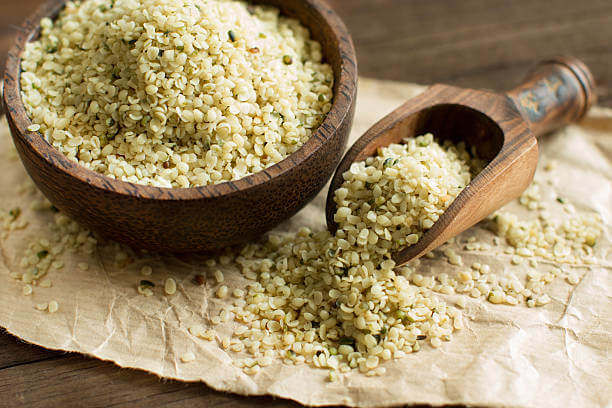
I love hemp seeds because they’re so versatile and may be one of the best foods for depression. They don’t have a lot of flavor so it’s easy to eat in dishes where you don’t want any extra flavors.
Hemp seeds were once considered a byproduct of the hemp fiber industry, but it has since been recognized for its nutritional value and health benefits.
The seeds are responsible for the production of the hemp plant. Yes, the same plant that is responsible for the drug that gets people high.
Don’t worry, you won’t get high from eating hemp plants – just a myriad of incredible health benefits.
Like fish and algae, hemp seeds contain brain-boosting omega-3 fatty acids that protect the nerves and brain from damage. That helps to prevent the dreaded age-related cognitive decline.
Protecting your valuable brain cells is an absolute must for staving off cognitive decline and having the best possible brain that supports happiness and overall mental health.
The omega 3’s in hemp seeds help to protect neurons from oxidative damage, prevent the growth of cancerous cells, and help reduce brain-robbing inflammation.
Hemp seeds are also high in magnesium, and vitamins, and contain all 9 of the essential amino acids needed in the human body. The combo of those three elements is incredible for the brain and supports mental well-being.
How to incorporate hemp seeds into your diet? Throw them in a yogurt bowl, or oatmeal, or add them to your smoothies.
7. Whole Grains
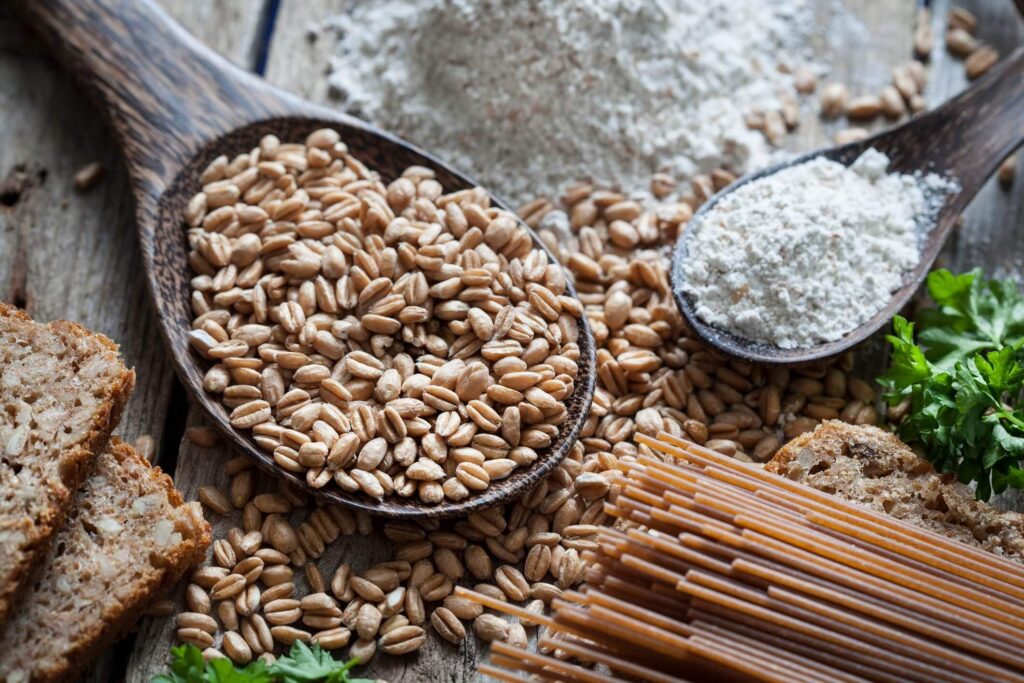
While I’m not a huge fan of gluten-containing grains that can potentially rob a person of brainpower, I wholeheartedly believe and benefit from the brain-boosting benefits of certain grains.
Grains are also a great base for many of the other best foods for depression and help to put together many brain-boosting nutrients. A great example is fish and avocado on a slice of sourdough bread.
Grains also happen to be a staple of The Mediterranean Diet – possibly the healthiest diet on Earth.
Here are some ways that whole grains support a healthy brain:
- Rich in B Vitamins that reduce inflammation in the brain.
- May be linked to slower cognitive decline.
- High in complex carbohydrates – a steady source of fuel for the brain.
- May help to boost memory.
It’s very easy to add whole grains to your diet if you aren’t already. I do recommend using grains as a way to get in other brain food nutrients, such as leafy greens or salmon.
My favorite way to include grains into my diet is through masa corn tacos that are loaded with lean protein, healthy fats, pinto beans, and vegetables.
Find out whether or not you’re allergic to gluten to know which grains to shop for. Check out this post on Healthline to learn about the best gluten-free grains.
8. Carrots
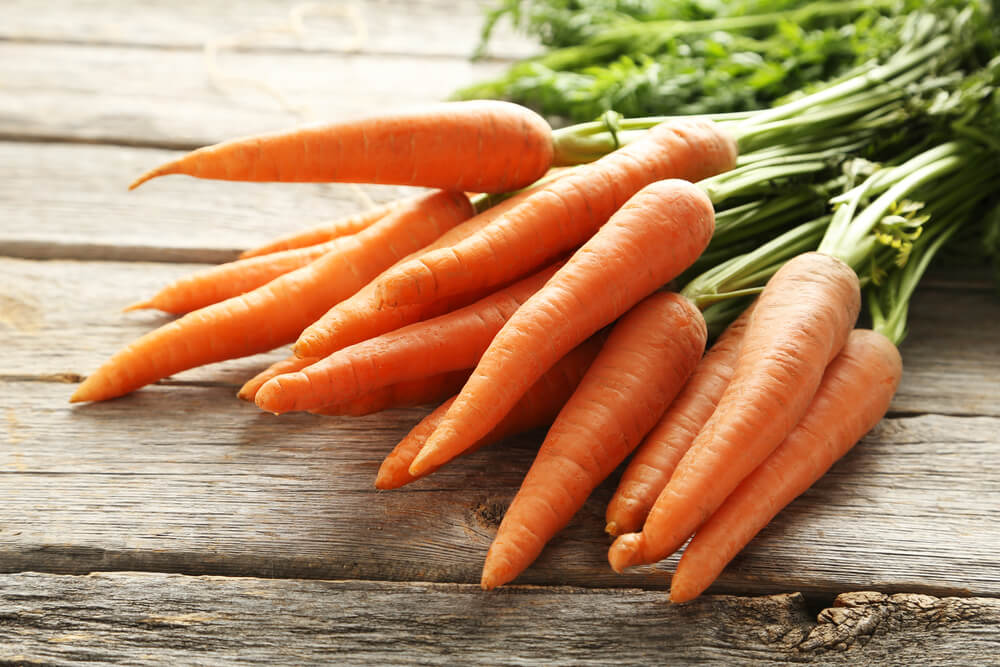
The reason why carrots are one of the best foods for depression might be a little surprising – they’re linked to higher levels of optimism!
Beta carotene is the culprit that is linked with higher levels of optimism in people who eat them. One of the hallmarks of depression is lower motivation and increased pessimism.
Carrots and other foods that are high in beta carotene support creating the opposite effect in the brain – more zest for life and less pessimism!
In a study that surveyed 982 people, there was an astonishing link between the individual’s level of optimism and intake of beta carotene.
If you aren’t already, start adding carrots to your diet. I’ll admit, I need to work on getting more creative with my own intake of carrots. I’m really not a fan of eating a whole carrot by itself.
Veggies and hummus are a really easy snack and a good way to not eat not only carrots but also get the healthy fats from the hummus.
If you need some help with finding ways to add carrots to your diet, check out this resource.
Recap
I discovered the brain-boosting benefits of nutrition by reading Eat to Beat Depression by Dr. Drew Ramsey. I’ve been amazed at how big of a role nutrition plays in a person’s mental health!
In contrast, its brain food nutrition has been a game changer for my own mental health.
Start being mindful of the impact that nutrition has on your mood and overall mental health because it does indeed play a huge role.
Start supporting your mental well-being today by incorporating more brain food nutrients into your diet.
If you know somebody who is struggling with anxiety or depression, please share this blog post with them.
Disclaimer: The content in this blog post is for educational purposes only. Please consult your doctor or other qualified health professional before using any of the tips contained herein.
